Click to listen to the audio…
How to avoid being exposed to persistant organic pollutants
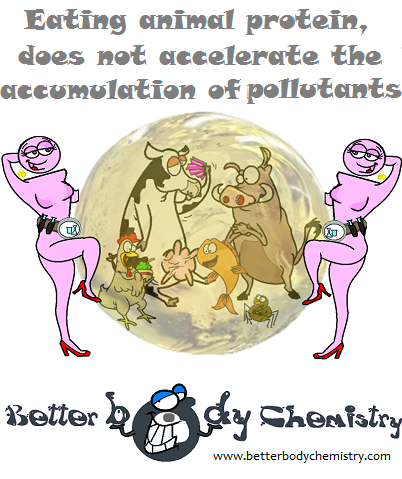
When you eat, the fat deposit of an animal, you end up eating, it’s fat supply, along with all the organic pollutants, stored in it…… BUT eating is not keeping
When it comes to food…….
One of the things we “need” to worry about, more and more, is FOOD POLLUTION.
i.e. the chemicals and things, that end up in food, ACCIDENTLY.
No one officially, puts them in our food, but thanks to their presence in the environment, they’re there. One class of such pollutants are POPs (persistent organic pollutants).
These chemicals are associated with BAD BODY CHEMISTRY.
POPs love fat
As organic molecules, these guys gravitate towards fats, because like dissolves in like. Now, all creatures, great and small, have fat deposits, of one kind or another. And, if you eat, the fat deposit of a creature, great or small, you end up eating, their fat supply and their organic pollutants.

Which means…
the greater the number of organisms you’re eating, the greater the organic pollutant burden, you’re consuming.
Top of the food chain
This tendency to pass pollutants up food chains, is referred to as bioaccumulation – it makes life at the top of the food chain, precarious. Since humans, often live, at the top of the food chain, it is a very real health concern.
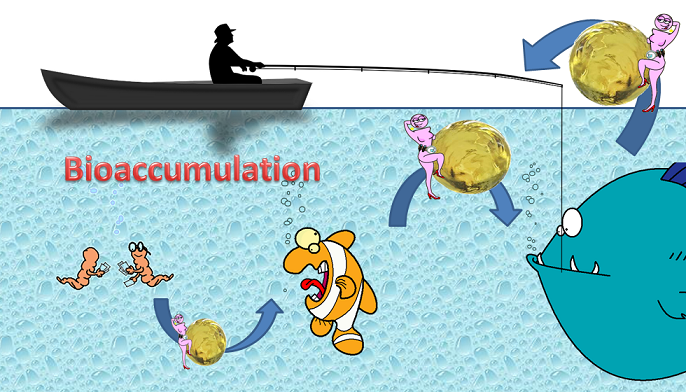
And health gurus, advocate doing what you can do DECREASE EXPOSURE.
So how do you achieve this ?
One idea, don’t eat lots of animal products or put another way, adopt a low fat diet.
Intuitively, this makes perfect sense……..
But, biology does not always OBEY, human logic.
More fat, less POPs
Several, mouse studies, have hinted, animals eating a high carb, low fat diet, actually accumulate MORE POPs. Go figure !
But, mice are NOT humans, so does this pattern hold true, for humans ?
This is what a team of researchers from Korea, set out to look at….
POPS keep popping out
Now, although on paper, this sounds, like a pretty easy study to do……….It’s NOT.
POPs are complicated.
They’re stored in fat cells, but, they don’t obediently sit there – they move in and out. One of the biggest drivers of this movement, is equilibrium. Basically, the body works at keep EVERYTHING, in balance.
EVERYTHING includes POPs.
The amount in the circulation, is in proportion to the amount in fat cells.

So what you did, three months ago, has the potential to impact, what is happening, today ! This makes, studying how diet, impacts POP levels difficult, because it’s expensive and hard, to run long term studies, in humans. Eish !
Looking for patterns
But, you can look for patterns…….this is the approach our team took, they started off, with a “big” data set, that had been collected, by the CDC, as part of the NHANES study, between 1999 and 2004.
To be included in their analysis, participants must have had their blood levels of organochlorine pesticides measured, at the time of their inclusion in the study.
NOTE : Not everyone, who was part of the NHANES study, had this measurement done.
And, to eliminate the influence of BAD BODY CHEMISTRY, as far as possible, they needed to be “healthy” i.e. they could not be suffering from or have suffered from :
- diabetes
- dyslipidemia i.e. “high” cholesterol
- hypertension
- coronary heart disease
- stroke
- cancer
At the end of all these EXCLUSIONS, the team was left with data on 1764 individuals.
Did eating a fat rich diet, make things worse ?
The short answer…………
The higher the fat in the diet, the lower the levels of organochlorine pesticides.
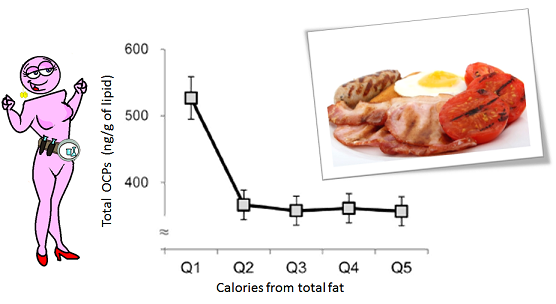
The sum of organochlorine pollutants concentrations according diet, relative to the percentage of fat eaten. Quartile one, corresponds with the lowest fat consumption, quartile five, with the highest. Copyright 2019 Elsevier Ltd
Which fat, you might ask – after all, there is GOOD fat and BAD fat. Well, the BAD fat i.e. saturated fat, which primarily comes from animal protein, was protective. It really didn’t seem to make much difference, what amount of polyunsaturated fat (PUFAs) you ate.
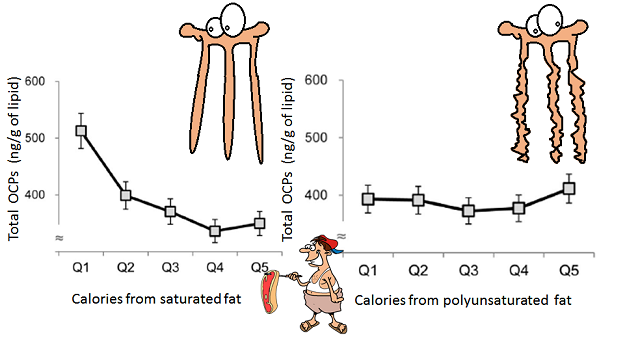
The sum of organochlorine pollutants concentrations according diet. Copyright 2019 Elsevier Ltd
NOTE : This is probably because PUFAs are a mixed bag of things. Omega 3s primarily come from animal protein (fish) and omega 6s, primarily come from vegetable oils.
The worst dietary habit, you could have, in terms of your organic pollutant levels ……………
Eating a high carb diet.

The sum of organochlorine pollutants concentrations according diet. Quartile 5 would be people eating the highest amount of carbs in their diet. Copyright 2019 Elsevier Ltd
Ouch ! This is definitely COUNTER-INTUITIVE..
But, it’s good news………..
Score 1 for low carb
Lowering carb intake, particularly when your ability to “handle” carbs is compromised, helps to create BETTER BODY CHEMISTRY.
And, despite expectations, it doesn’t put you at an increased risk, of
“poisoning yourself SLOWLY through increased exposure to pollutants”.
Why does it work ?
At this stage, no one knows for sure.
One idea, is the increased consumption of fats, causes the release of more bile acids.
Since, one of the roles of bile acids, is facilitate the elimination of lipid soluble chemicals, from the body. More bile acids, potentially, means there is an increase in POP elimination.
Maybe it’s just a case of BETTER BODY CHEMISTRY….
A grocery is a grocery ?
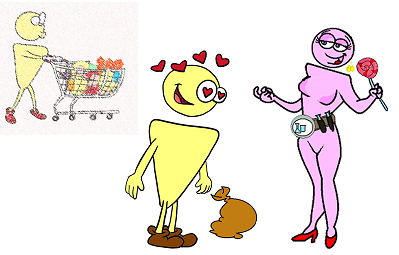 Remember, insulin’s job, is to put away the groceries.
Remember, insulin’s job, is to put away the groceries.
Sugar is the chief grocery, he is responsible for.
But, if you look at the world, through insulin’s eyes – pretty much everything coming in, with the exception of fats, is a grocery.
He does take his job, very seriously.
Maybe he sees the POPs as a “grocery”.
The how is not so important…
It’s impossible to avoid exposure to POPs, they’re everywhere.
This study corroborates the data seen in mice studies……….
Adopting a higher fat diet, will not slowly poison you, through increased exposure to POPs
In fact, it might just do the opposite i.e. it mitigates the risk of POP exposure. Yah !
Further reading
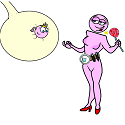
Pollutants are bringing the change of life earlier
Just like genetics, our “exposomes” (chemical exposures) are all different. Your exposome brings menopause on, a few years earlier than your genes intended.

Too much fat may not be to blame for metabolic syndrome
You can be metabolically healthy and obese. You cannot be metabolically healthy with a specific profile of POPs. Are POPs the cause of obesity ?
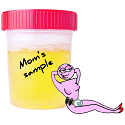
When your world smells good, your baby’s world is polluted
Phthalates, make things smell good, but, they look a lot like our hormones, since hormones run our body chemistry, this similarity is problematic
